-
 Bitcoin
Bitcoin $86,250.6982
1.63% -
 Ethereum
Ethereum $1,890.1026
-0.98% -
 Tether USDt
Tether USDt $1.0000
0.01% -
 XRP
XRP $2.1367
0.29% -
 BNB
BNB $603.5934
-0.76% -
 Solana
Solana $129.4201
2.45% -
 USDC
USDC $1.0000
0.00% -
 Dogecoin
Dogecoin $0.1724
0.45% -
 Cardano
Cardano $0.6839
0.62% -
 TRON
TRON $0.2381
0.57% -
 Toncoin
Toncoin $3.9840
-0.47% -
 Chainlink
Chainlink $13.8431
-2.30% -
 UNUS SED LEO
UNUS SED LEO $9.3956
0.41% -
 Stellar
Stellar $0.2705
-1.46% -
 Avalanche
Avalanche $19.2650
-0.80% -
 Sui
Sui $2.4309
0.03% -
 Shiba Inu
Shiba Inu $0.0...01260
-0.64% -
 Hedera
Hedera $0.1716
0.58% -
 Polkadot
Polkadot $4.1457
-0.42% -
 Litecoin
Litecoin $85.5964
0.72% -
 Bitcoin Cash
Bitcoin Cash $308.6728
-0.07% -
 MANTRA
MANTRA $6.3356
0.99% -
 Bitget Token
Bitget Token $4.5842
-0.52% -
 Dai
Dai $0.9997
-0.04% -
 Ethena USDe
Ethena USDe $0.9999
0.01% -
 Hyperliquid
Hyperliquid $13.7596
4.34% -
 Pi
Pi $0.6794
-3.81% -
 Monero
Monero $219.4683
1.07% -
 Uniswap
Uniswap $6.1878
-0.70% -
 Aptos
Aptos $5.3777
0.02%
Are the mining income of IPFS mining affected by network delay?
Network delay can significantly reduce IPFS mining income by slowing data retrieval, missing storage deals, and lowering node reputation and availability.
Apr 01, 2025 at 09:36 pm
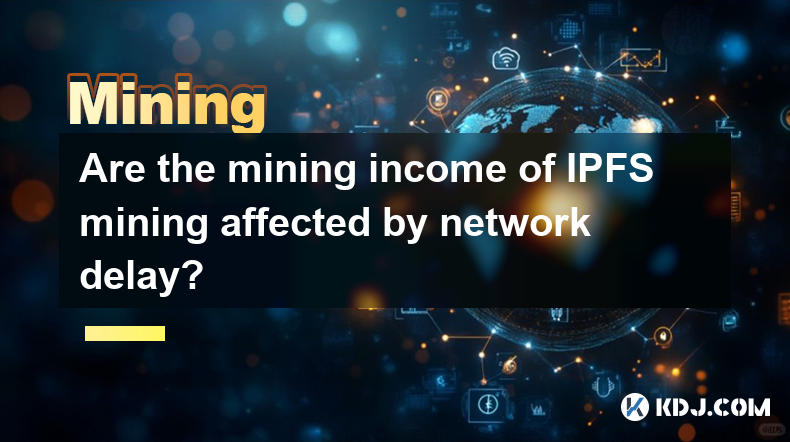
Are the Mining Incomes of IPFS Mining Affected by Network Delay?
Understanding IPFS Mining and Network Delay's Impact
IPFS (InterPlanetary File System) mining, unlike Bitcoin mining, doesn't involve solving complex cryptographic puzzles. Instead, it focuses on providing storage and bandwidth to the network. Miners earn rewards for storing and sharing data, contributing to the overall decentralization and efficiency of the IPFS network. Network delay, however, can significantly impact a miner's income.
How Network Delay Affects IPFS Mining Income
Network delay, the time it takes for data to travel between your node and other nodes on the IPFS network, directly affects your ability to participate in the network's activities. High latency means slower data transfer speeds. This impacts several key aspects of IPFS mining:
Reduced Data Retrieval Speed: Slow connections mean you'll take longer to retrieve data requests, potentially missing out on retrieval rewards or failing to meet service level agreements (SLAs) if you're providing storage for clients. This directly translates to lower earnings.
Missed Opportunities for Storage Deals: IPFS miners earn rewards by storing data for clients. High latency might cause you to miss out on storage deals because other miners with faster connections will be preferred. Clients prioritize speed and reliability, and slow nodes are less likely to be selected.
Lower Availability and Reputation: Frequent disconnections or slow response times can negatively impact your node's reputation within the IPFS network. A poor reputation can lead to fewer storage requests and, consequently, lower income. Consistent availability is crucial for success.
Difficulty in Participating in Pinning: Pinning is the process of keeping data readily available on your node. High latency can make pinning less efficient, reducing your contribution to the network and decreasing your chances of earning rewards. Reliable pinning is essential for consistent income.
Impact on File Retrieval and Delivery: If you are participating in the retrieval process, network latency directly impacts your ability to deliver files quickly. Slow delivery times can result in penalties or loss of future opportunities. Speed is a crucial factor here.
Optimizing Your IPFS Mining Setup to Minimize Network Delay
Several steps can be taken to mitigate the negative effects of network delay on your IPFS mining income:
Invest in a High-Speed Internet Connection: A fast and stable internet connection is paramount. Consider a dedicated connection with high upload and download speeds and low latency.
Choose a Strategically Located Server: The physical location of your server matters. A server closer to major IPFS network hubs will experience lower latency.
Optimize Your Network Configuration: Properly configure your router and firewall to minimize network congestion and prioritize IPFS traffic.
Use a Powerful Server: Sufficient processing power and RAM are essential for efficient data handling and quick response times. A weak server will amplify the effects of network delay.
Regularly Monitor Your Network Performance: Keep a close eye on your network metrics, such as ping, latency, and packet loss, to identify and address any issues promptly.
Upgrade your hardware: Outdated hardware can significantly increase latency. Consider upgrading your server hardware for better performance.
Understanding the Relationship Between Network Delay and Profitability
The relationship between network delay and profitability in IPFS mining is inversely proportional. Higher network delay generally leads to lower profitability, while lower network delay improves profitability. This is because efficient and fast data transfer is crucial for participating in the network's various activities and earning rewards. The speed and reliability of your connection directly impact your ability to compete with other miners.
Frequently Asked Questions
Q: Can I mine IPFS with a slow internet connection?
A: While you can technically mine IPFS with a slow connection, your profitability will be significantly reduced due to missed opportunities and penalties for slow response times. A fast and reliable connection is crucial for maximizing your earnings.
Q: How much does network delay affect my IPFS mining income?
A: The impact varies depending on the severity of the delay and the specific tasks your node performs. High latency can significantly reduce your income, while moderate latency may have a less noticeable effect.
Q: What are the best practices for minimizing network delay in IPFS mining?
A: Prioritize a fast and stable internet connection, choose a strategically located server, optimize your network configuration, use powerful hardware, and regularly monitor your network performance.
Q: Is it worth investing in high-speed internet for IPFS mining?
A: Yes, especially if you aim for significant earnings. The cost of a high-speed connection is often outweighed by the increased profitability resulting from reduced network delay and improved reliability.
Q: Can I use a residential internet connection for IPFS mining?
A: It's possible, but not recommended for serious mining operations. Residential connections often have bandwidth limitations and less stable uptimes compared to dedicated server connections, negatively impacting your earnings.
Q: What tools can I use to monitor my network performance for IPFS mining?
A: Many tools are available, including ping, traceroute, and network monitoring software that can track latency, packet loss, and other relevant metrics. Your operating system likely has built-in tools as well.
Q: Does the geographical location of my server significantly impact network delay?
A: Yes, significantly. Servers closer to major IPFS network hubs will experience lower latency, resulting in faster data transfer speeds and improved profitability.
Disclaimer:info@kdj.com
The information provided is not trading advice. kdj.com does not assume any responsibility for any investments made based on the information provided in this article. Cryptocurrencies are highly volatile and it is highly recommended that you invest with caution after thorough research!
If you believe that the content used on this website infringes your copyright, please contact us immediately (info@kdj.com) and we will delete it promptly.
- Grayscale Launches Two New Bitcoin ETFs: BTCC and BPI
- 2025-04-03 02:05:12
- Bitcoin (BTCUSD) Has Been on an Upward Trajectory Despite Volatility in Crypto and Traditional Markets
- 2025-04-03 02:05:12
- Ripple Integrates Its USD-Backed Stablecoin to Cross-Border Payments System
- 2025-04-03 02:00:12
- Dogecoin (DOGE) Forms Inverse H&S Pattern, Presenting Immediate Breakout Targets
- 2025-04-03 02:00:12
- Retesting the 61.8% Fibonacci Retracement Level Could Be a Defining Moment for the SOL/USD Pair
- 2025-04-03 01:55:13
- Ozak AI (OZ) Could Be the Next 1000x Gainer, Not Gold
- 2025-04-03 01:55:13
Related knowledge
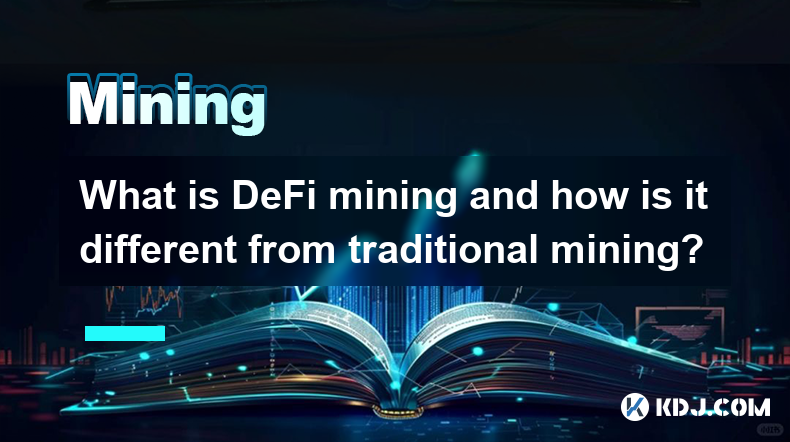
What is DeFi mining and how is it different from traditional mining?
Apr 02,2025 at 09:50am
DeFi mining, also known as yield farming or liquidity mining, is a process within the decentralized finance (DeFi) ecosystem where users provide liquidity to decentralized platforms in exchange for rewards. Unlike traditional mining, which involves solving complex mathematical problems to validate transactions and add them to a blockchain, DeFi mining f...
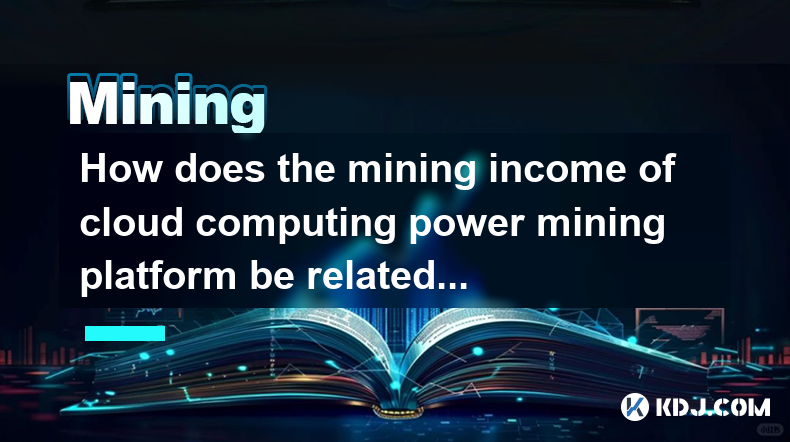
How does the mining income of cloud computing power mining platform be related to mining pool allocation?
Apr 02,2025 at 01:56am
The relationship between the mining income of a cloud computing power mining platform and the allocation of mining pools is a crucial aspect of cryptocurrency mining. Mining income is influenced by various factors such as the efficiency of the mining hardware, electricity costs, and the specific cryptocurrency being mined. However, the allocation of min...
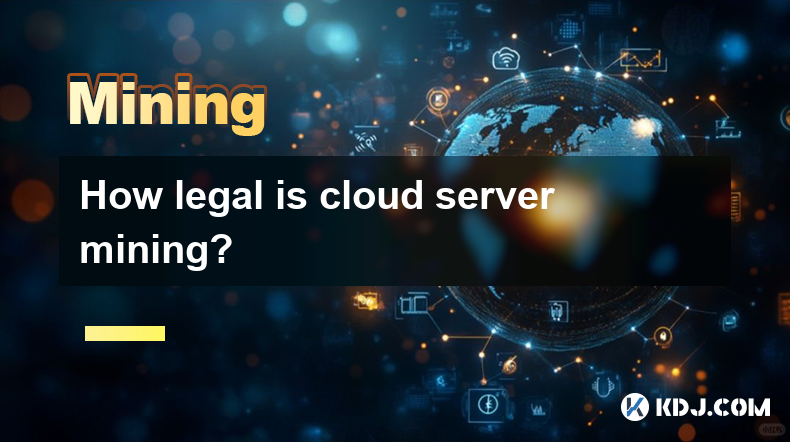
How legal is cloud server mining?
Apr 01,2025 at 08:08am
Cloud server mining has become an increasingly popular method for individuals and companies to participate in cryptocurrency mining without the need for expensive hardware and high electricity costs. However, the legality of cloud server mining can be a complex issue, as it varies by jurisdiction and depends on several factors. This article will explore...
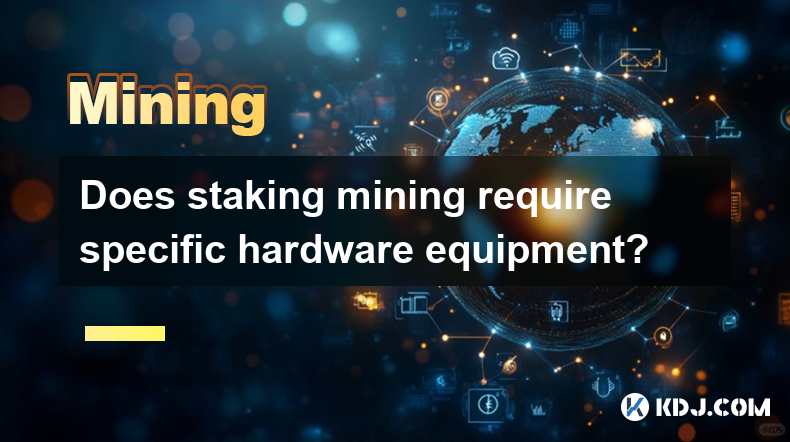
Does staking mining require specific hardware equipment?
Apr 02,2025 at 08:21am
Staking mining, often referred to simply as staking, is a process used by various cryptocurrencies to secure their networks and validate transactions. Unlike traditional mining, which often requires specialized hardware like ASICs (Application-Specific Integrated Circuits) or high-performance GPUs (Graphics Processing Units), staking typically does not ...

Are the mining income of IPFS mining affected by network delay?
Apr 01,2025 at 09:36pm
Are the Mining Incomes of IPFS Mining Affected by Network Delay? Understanding IPFS Mining and Network Delay's ImpactIPFS (InterPlanetary File System) mining, unlike Bitcoin mining, doesn't involve solving complex cryptographic puzzles. Instead, it focuses on providing storage and bandwidth to the network. Miners earn rewards for storing and sharing dat...
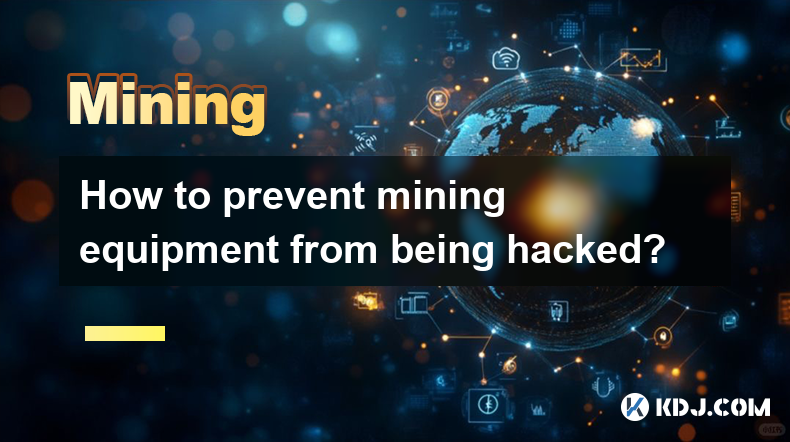
How to prevent mining equipment from being hacked?
Apr 01,2025 at 06:22am
Understanding the ThreatsCryptocurrency mining, while potentially lucrative, exposes your equipment to various cyber threats. These threats range from simple malware infections that steal your mining profits to sophisticated attacks that hijack your entire operation. Understanding these threats is the first step in effective protection. This includes r...

What is DeFi mining and how is it different from traditional mining?
Apr 02,2025 at 09:50am
DeFi mining, also known as yield farming or liquidity mining, is a process within the decentralized finance (DeFi) ecosystem where users provide liquidity to decentralized platforms in exchange for rewards. Unlike traditional mining, which involves solving complex mathematical problems to validate transactions and add them to a blockchain, DeFi mining f...

How does the mining income of cloud computing power mining platform be related to mining pool allocation?
Apr 02,2025 at 01:56am
The relationship between the mining income of a cloud computing power mining platform and the allocation of mining pools is a crucial aspect of cryptocurrency mining. Mining income is influenced by various factors such as the efficiency of the mining hardware, electricity costs, and the specific cryptocurrency being mined. However, the allocation of min...

How legal is cloud server mining?
Apr 01,2025 at 08:08am
Cloud server mining has become an increasingly popular method for individuals and companies to participate in cryptocurrency mining without the need for expensive hardware and high electricity costs. However, the legality of cloud server mining can be a complex issue, as it varies by jurisdiction and depends on several factors. This article will explore...

Does staking mining require specific hardware equipment?
Apr 02,2025 at 08:21am
Staking mining, often referred to simply as staking, is a process used by various cryptocurrencies to secure their networks and validate transactions. Unlike traditional mining, which often requires specialized hardware like ASICs (Application-Specific Integrated Circuits) or high-performance GPUs (Graphics Processing Units), staking typically does not ...

Are the mining income of IPFS mining affected by network delay?
Apr 01,2025 at 09:36pm
Are the Mining Incomes of IPFS Mining Affected by Network Delay? Understanding IPFS Mining and Network Delay's ImpactIPFS (InterPlanetary File System) mining, unlike Bitcoin mining, doesn't involve solving complex cryptographic puzzles. Instead, it focuses on providing storage and bandwidth to the network. Miners earn rewards for storing and sharing dat...

How to prevent mining equipment from being hacked?
Apr 01,2025 at 06:22am
Understanding the ThreatsCryptocurrency mining, while potentially lucrative, exposes your equipment to various cyber threats. These threats range from simple malware infections that steal your mining profits to sophisticated attacks that hijack your entire operation. Understanding these threats is the first step in effective protection. This includes r...
See all articles
























































































